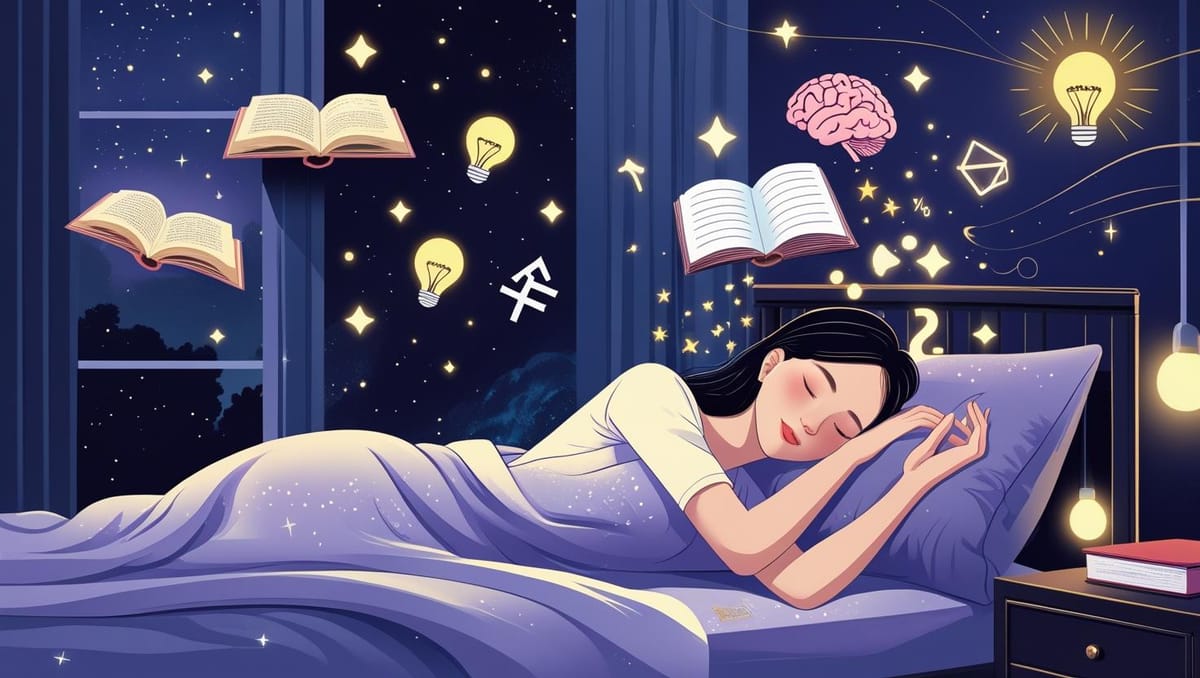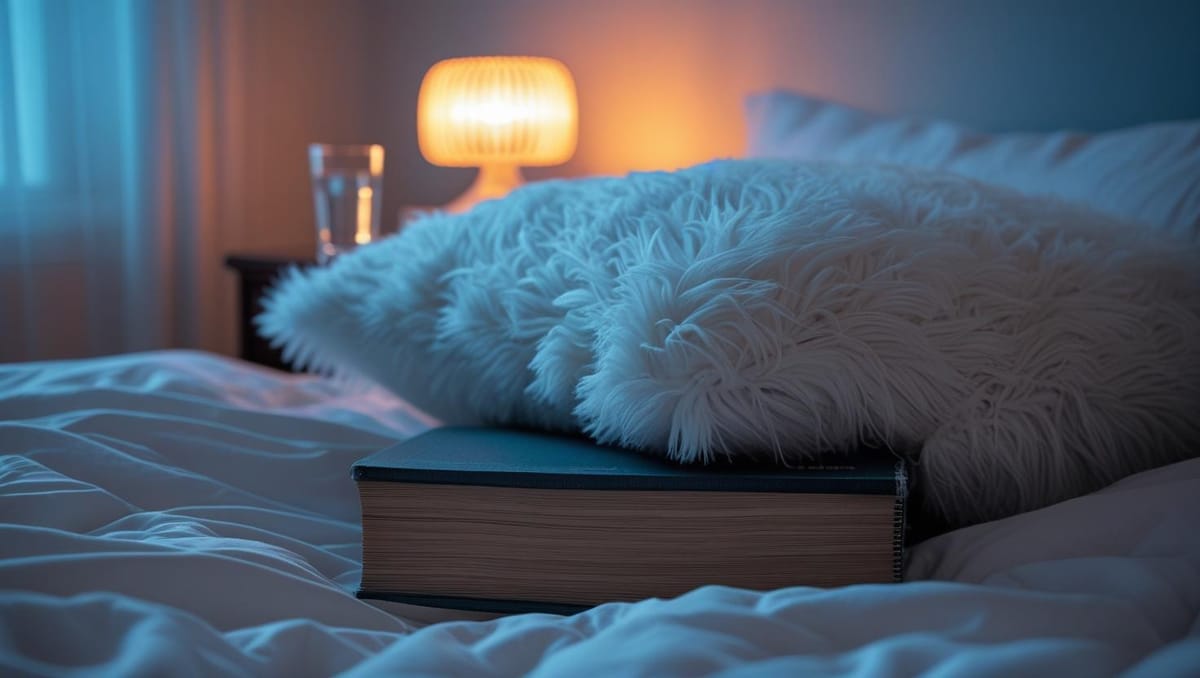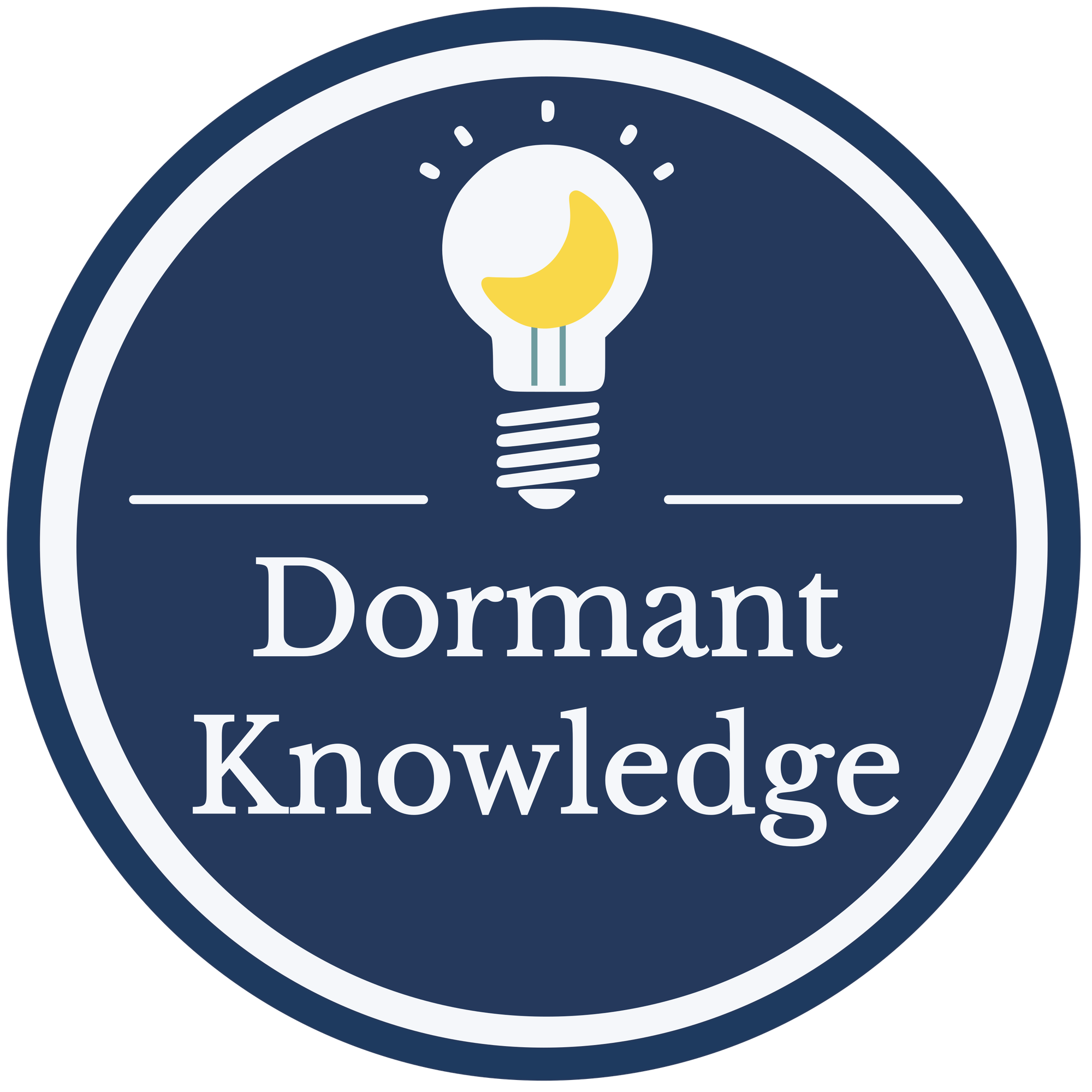The Complete Guide to Educational Sleep Podcasts: How to Learn While You Sleep
Educational sleep podcasts represent a revolutionary approach to making the most of our bedtime hours. By combining the intellectual satisfaction of learning with the practical necessity of sleep, they offer a sustainable solution for curious minds in our time-pressed world.

In our fast-paced world where time feels increasingly scarce, the idea of learning while you sleep sounds almost too good to be true. Yet a growing body of research suggests that the drowsy brain is uniquely positioned to absorb certain types of information, leading to the emergence of educational sleep podcasts: a revolutionary approach to bedtime that transforms your nightly routine into an opportunity for intellectual growth.
This comprehensive guide explores everything you need to know about educational sleep podcasts: how they work, what makes them effective, how to choose the right content, and how to optimize your experience for both learning and restful sleep.
What Are Educational Sleep Podcasts?
Educational sleep podcasts are audio programs specifically designed to deliver fascinating, intellectually stimulating content in a format that promotes relaxation and sleep. Unlike traditional educational podcasts that demand active attention, or sleep podcasts that focus solely on relaxation, educational sleep podcasts occupy a unique middle ground.
These shows combine genuine learning opportunities with sleep-inducing delivery techniques: slower pacing, conversational tones, carefully selected topics, and extended episode lengths that support both sleep onset and maintenance throughout the night.
The concept represents a fundamental shift from viewing bedtime as "empty time" to recognizing those precious 45-60 minutes as an opportunity for gentle intellectual growth while caring for your body's need for rest.
The Science Behind Sleep Learning
How the Drowsy Brain Processes Information
Research in neuroscience reveals that the transition from wakefulness to sleep creates optimal conditions for certain types of learning. Dr. Matthew Walker, renowned sleep researcher and author of "Why We Sleep," explains that different states of consciousness serve different cognitive functions:
"When it comes to info processing, think of the wake state principally as reception (experiencing and constantly learning the world around you), NREM sleep as reflection (storing and strengthening those raw ingredients of new facts and skills), and REM sleep as integration (interconnecting those raw ingredients with each other, with all past experiences, and, in doing so, building an ever more accurate model of how the world works, including innovative insights and problem-solving abilities)."
This means the drowsy state—that liminal space between waking and sleeping—is particularly well-suited for absorbing abstract concepts, broad patterns, and contextual information that doesn't require immediate practical application.
You can read more about the science of learning while sleeping in a previous blog post:

The Role of Diffuse Attention
During the transition to sleep, our brains shift from "focused attention" (the concentrated thinking we use for complex tasks) to "diffuse attention" (a more relaxed, associative mode of processing). This diffuse state is ideal for:
- Absorbing general knowledge without pressure to immediately apply it
- Processing abstract concepts like historical patterns or scientific principles
- Making unexpected connections between seemingly unrelated ideas
- Integrating new information with existing knowledge frameworks
Awe and the Parasympathetic Response
Many effective educational sleep podcasts feature content that naturally evokes awe—cosmic scales, historical sweep, scientific wonder. Research by Dr. Michelle Shiota at Arizona State University shows that awe-inducing experiences trigger the parasympathetic nervous system, promoting the relaxation response essential for sleep.
"When people feel awe, their mind clears and their attention becomes focused on the extraordinary thing evoking this emotion," Shiota notes. This focused-yet-calm state is ideal for sleep learning, providing just enough cognitive engagement to prevent anxious mind-wandering while maintaining the relaxed alertness conducive to both learning and sleep onset.
What Makes Educational Sleep Podcasts Effective?
Content Selection Criteria
Not all educational content works well for sleep learning. The most effective educational sleep podcasts carefully select topics based on specific criteria:
Intellectually Fascinating but Not Urgent Topics like the history of mathematical discoveries, astronomical phenomena, or ancient civilizations provide rich learning opportunities without creating anxiety about immediate practical application.
Abstract Rather Than Concrete Content focusing on broad concepts, historical patterns, and theoretical frameworks works better than detailed technical instructions or step-by-step procedures.
Emotionally Neutral While dramatic historical events may be fascinating, the most effective sleep learning content avoids emotionally charged topics that could increase arousal rather than promote relaxation.
Naturally Expansive Topics that naturally lead to contemplation of vast scales—whether temporal (geological time), spatial (cosmic distances), or conceptual (philosophical questions)—tend to promote the mental state conducive to both learning and sleep.
Delivery Techniques That Work
Conversational Pacing Effective educational sleep podcasts avoid the rapid-fire delivery common in traditional educational content. Instead, they adopt a conversational pace that allows time for mental imagery and reflection.
Natural Speech Patterns The best sleep learning hosts include natural speech patterns—brief pauses, occasional filler words, gentle corrections—that mimic how someone might share fascinating information in casual conversation rather than formal lecture format.
Ambient Sound Integration Many successful educational sleep podcasts incorporate subtle ambient sounds—gentle page turning, quiet room tone, or soft background textures—that enhance the intimate, personal feeling of bedtime learning.
Strategic Repetition Since listeners may drift in and out of attention, effective programs naturally reinforce key concepts through gentle repetition and varied approaches to the same ideas.
Types of Educational Sleep Podcast Content
Historical Narratives
Stories from the past work exceptionally well for sleep learning because they:
- Provide natural narrative structure that's easy to follow
- Often feature human interest elements that maintain engagement
- Don't require immediate practical application
- Can be appreciated even if attention drifts during portions
Examples: The discovery of Pluto, the invention of the light bulb, ancient civilizations
Scientific Concepts
Abstract scientific principles excel as sleep learning content when presented with:
- Focus on wonder and implications rather than technical details
- Human stories behind discoveries
- Connection to everyday experience
- Emphasis on big-picture understanding
Examples: The history of calculus, quantum physics concepts, evolutionary biology
Philosophical Ideas
Philosophical content works well because it:
- Naturally promotes contemplative states
- Doesn't require memorization of facts
- Encourages broad, associative thinking
- Benefits from the relaxed mental state
Examples: Ancient philosophy, ethical frameworks, questions of consciousness
Cultural Exploration
Learning about different cultures provides:
- Rich sensory imagery that engages imagination
- Broad perspectives that expand worldview
- Interesting contrasts with familiar experiences
- Natural connection to universal human themes
Examples: Traditional practices, architectural wonders, linguistic patterns
How to Choose the Right Educational Sleep Podcast
Assess Your Learning Style
Visual Learners: Look for podcasts with rich descriptive language that helps you create mental imagery. Space-themed content often works well because it naturally engages visual imagination.
Auditory Learners: Seek programs with varied vocal patterns, perhaps multiple speakers, or content about music, languages, or acoustic phenomena.
Kinesthetic Learners: Choose content that involves movement, exploration, or hands-on discovery stories—like historical adventures or scientific expeditions.
Consider Your Interests and Background
Build on Existing Knowledge: Starting with topics you already find interesting but want to explore more deeply often works better than completely unfamiliar subjects.
Avoid Work-Related Content: Topics too closely connected to your professional life may create mental associations with stress or work obligations.
Embrace Curiosity Over Practicality: The best sleep learning topics are those that satisfy intellectual curiosity without immediate practical pressure.
Evaluate Production Quality
Audio Clarity: Clear, consistent audio without jarring volume changes or technical distractions is essential for sleep content.
Host Voice and Style: Look for hosts with naturally calming voices and conversational delivery styles. Overly energetic or dramatic presentation can be counterproductive.
Episode Length: Ideal episodes run 45-60 minutes—long enough to support extended sleep onset time and middle-of-night listening, but not so long as to be overwhelming.
Consistency: Regular release schedules and consistent quality help build sustainable bedtime routines.
Setting Up Your Sleep Learning Environment
Physical Environment
Comfortable Audio Setup
- Speakers: Work well if they don't disturb others; allow natural movement during sleep
- Sleep Headphones: Specially designed flat speakers for side sleepers
- Pillow Speakers: Built into or placed under pillows for minimal disruption
- Volume: Set low enough that you have to listen attentively but not strain to hear
Room Conditions
- Temperature: Slightly cool (65-68°F) promotes better sleep and attention
- Lighting: Very dim or complete darkness to support natural melatonin production
- Comfort: Ensure bedding and pillows support relaxed listening position
Mental Preparation
Set Realistic Expectations Don't expect to remember every detail. The goal is gentle absorption of concepts and perspectives rather than precise memorization.
Release Performance Pressure There's no test at the end. Allow yourself to drift in and out of attention naturally without anxiety about "missing" content.
Establish Routine Consistency helps train your brain to associate the content with sleep onset, making the process more effective over time.
Maximizing Your Sleep Learning Experience
Pre-Listening Strategies
Light Preview: Briefly reviewing episode descriptions or show notes can provide helpful context without spoiling the experience.
Set Intentions: Spend a moment considering what you hope to gain—general knowledge, perspective, relaxation, or simply intellectual satisfaction.
Create Transition Ritual: Develop a brief routine that signals your brain it's time to shift from daily concerns to learning and rest.
During Listening
Practice Soft Focus: Allow attention to be gentle and flexible rather than intense or concentrated.
Embrace Mental Imagery: Let your mind create pictures, scenes, and associations with the content being presented.
Don't Fight Sleep: If you begin drifting off, let it happen naturally. Your brain continues processing even as consciousness fades.
Post-Sleep Integration
Morning Reflection: Briefly consider what you remember or what new thoughts emerged overnight.
Casual Research: If something particularly intrigued you, allow yourself to explore it further through traditional learning methods.
Share Insights: Discussing interesting concepts with others helps solidify understanding and provides social connection around learning.
The Benefits of Educational Sleep Podcasts
Cognitive Benefits
Expanded Knowledge Base: Regular exposure to diverse topics gradually broadens your understanding of the world.
Improved Pattern Recognition: Learning about different fields helps develop meta-cognitive skills and cross-domain thinking.
Enhanced Creativity: The associative nature of sleep learning can spark unexpected connections and creative insights.
Intellectual Satisfaction: Feeding curiosity provides psychological benefits beyond pure knowledge acquisition.
Sleep Quality Benefits
Reduced Anxiety: Engaging content can interrupt worry cycles that prevent sleep onset.
Improved Sleep Routine: Regular podcast listening helps establish consistent bedtime habits.
Extended Support: Long-form content provides comfort for those who wake during the night.
Positive Sleep Associations: Learning replaces negative bedtime thoughts with intellectually stimulating material.
Lifestyle Benefits
Time Efficiency: Combines self-care (sleep) with personal development (learning) in a single activity.
Guilt Reduction: Transforms "unproductive" rest time into intellectually valuable experience.
Stress Relief: Provides mental escape from daily concerns through fascinating content.
Social Connection: Shared learning experiences create conversation opportunities with others.
Spotlight: Dormant Knowledge as the Ideal Educational Sleep Podcast
Dormant Knowledge exemplifies the best practices in educational sleep podcast design:
Carefully Curated Topics: Episodes explore fascinating subjects like the history of calculus, Pluto's discovery, and the invention of the light bulb—intellectually rich content without emotional charge or practical urgency.
Sleep-Optimized Delivery: Host Deb employs natural conversational pacing, includes authentic speech patterns like gentle corrections and brief tangents, and maintains the intimate tone of someone sharing fascinating knowledge with a friend.
Appropriate Length: 45-minute episodes provide substantial content without overwhelming listeners, perfect for both sleep onset and night-time support.
Genuine Educational Value: Unlike simplified "sleep stories," episodes offer real depth and learning opportunities that satisfy adult intellectual curiosity while promoting relaxation.
Consistent Quality: Regular release schedule and professional production values help listeners build sustainable bedtime learning routines.
Common Misconceptions About Sleep Learning
"You Can't Actually Learn While Sleeping"
While deep sleep isn't conducive to new learning, the drowsy transition state and light sleep phases do allow information processing. Educational sleep podcasts target these optimal windows.
"It's Just Entertainment, Not Real Learning"
Research shows that relaxed states can enhance certain types of learning, particularly abstract concepts and broad understanding. Many listeners report genuine knowledge retention and expanded perspectives.
"Any Educational Content Will Work"
Not all educational material is suitable for sleep learning. Content selection, pacing, and delivery style are crucial for effectiveness.
"It Will Keep Me Awake"
Properly designed educational sleep podcasts are specifically crafted to promote rather than prevent sleep through careful topic selection and delivery techniques.
Troubleshooting Common Issues
"The Content Keeps Me Too Alert"
Solutions:
- Try episodes on less personally engaging topics
- Start with shorter preview listening during daytime to assess stimulation level
- Focus on abstract rather than practical topics
- Consider switching to historical rather than scientific content (or vice versa)
"I Can't Remember Anything"
Remember: The goal isn't detailed memorization but gentle absorption of concepts and perspectives. Consider:
- Reviewing episode descriptions the next morning
- Discussing interesting points with others
- Following up on topics that sparked curiosity
- Trusting that subtle learning is occurring even without conscious memory
"I Keep Falling Asleep Too Quickly"
This is actually success! But if you want more conscious engagement:
- Listen slightly earlier in your bedtime routine
- Try sitting up initially before lying down
- Choose topics slightly more aligned with your interests
- Accept that different episodes will engage you differently
"The Audio Quality Disrupts My Sleep"
Solutions:
- Invest in better sleep-compatible audio equipment
- Adjust volume levels more carefully
- Try different speaker/headphone configurations
- Look for podcasts with more consistent audio production
Building a Sustainable Sleep Learning Practice
Start Gradually
Begin with 2-3 episodes per week rather than every night to allow your brain to adapt to the new routine.
Track What Works
Keep simple notes about which topics and styles work best for your personal sleep learning needs.
Stay Flexible
Allow your preferences to evolve and don't feel obligated to continue with content that doesn't serve you well.
Combine with Good Sleep Hygiene
Educational sleep podcasts work best as part of overall healthy sleep practices, not as a replacement for proper sleep environment and routine.
The Future of Educational Sleep Podcasts
As neuroscience research continues to reveal the learning potential of drowsy brain states, we can expect to see:
More Specialized Content: Programs designed for specific learning goals and sleep needs.
Enhanced Production Techniques: Better understanding of audio factors that optimize both learning and sleep.
Personalization: AI-driven content recommendations based on individual sleep patterns and learning preferences.
Integration with Sleep Technology: Combination with sleep tracking devices to optimize timing and content delivery.
Frequently Asked Questions
Q: How long does it take to see benefits from educational sleep podcasts? A: Many people notice improved sleep quality and reduced bedtime anxiety within a few sessions. Learning benefits tend to accumulate gradually over weeks and months of regular listening.
Q: Can children use educational sleep podcasts? A: Yes, but content should be age-appropriate. Younger children often benefit from simpler storytelling approaches, while teens may enjoy content similar to adult educational sleep podcasts.
Q: Is it safe to sleep with headphones or earbuds? A: Sleep-specific headphones designed for side sleeping are generally safe. Avoid regular earbuds that might cause ear discomfort. Set volume levels carefully to protect hearing.
Q: What if my partner finds the audio disruptive? A: Consider sleep headphones, pillow speakers, or very low-volume audio. Some couples enjoy listening together, while others establish separate sleep routines.
Q: How do educational sleep podcasts compare to audiobooks? A: Educational sleep podcasts are specifically designed for bedtime listening with appropriate pacing and topics. Most audiobooks are too engaging or emotionally involving for optimal sleep learning.
Q: Can I use educational sleep podcasts if I have insomnia? A: Many people with insomnia find educational sleep podcasts helpful because they provide gentle mental engagement that can interrupt anxious thought patterns. However, individual responses vary, and serious sleep disorders should be addressed with medical professionals.
Conclusion: Transform Your Nights Into Learning Opportunities
Educational sleep podcasts represent a revolutionary approach to making the most of our bedtime hours. By combining the intellectual satisfaction of learning with the practical necessity of sleep, they offer a sustainable solution for curious minds in our time-pressed world.
Whether you're fascinated by historical discoveries, scientific wonders, philosophical questions, or cultural explorations, educational sleep podcasts provide a unique opportunity to feed your curiosity while caring for your body's need for rest.
The key to success lies in choosing content that matches your interests and learning style, setting up an environment that supports both learning and sleep, and maintaining realistic expectations about the gentle, gradual nature of sleep learning.
As research continues to reveal the remarkable capabilities of the drowsy brain, educational sleep podcasts will likely become an increasingly important tool for lifelong learners who refuse to accept that bedtime must mean the end of intellectual engagement.
Start your sleep learning journey tonight, and discover how the hours you spend transitioning to sleep can become some of the most intellectually rewarding of your day.
Ready to experience the unique benefits of educational sleep learning? Explore Dormant Knowledge, where you can fall asleep while discovering fascinating topics like the rivalry between Newton and Leibniz, the story of Pluto's reclassification, and the real invention of the light bulb. Available on all major podcast platforms.
About Dormant Knowledge: We're the educational sleep podcast for curious minds who want to learn fascinating topics while gently drifting off to sleep. Follow us @dormantknowledge on Instagram and Facebook, or @drmnt_knowledge on X. Visit dormantknowledge.com for episodes, transcripts, and more sleep learning resources.





